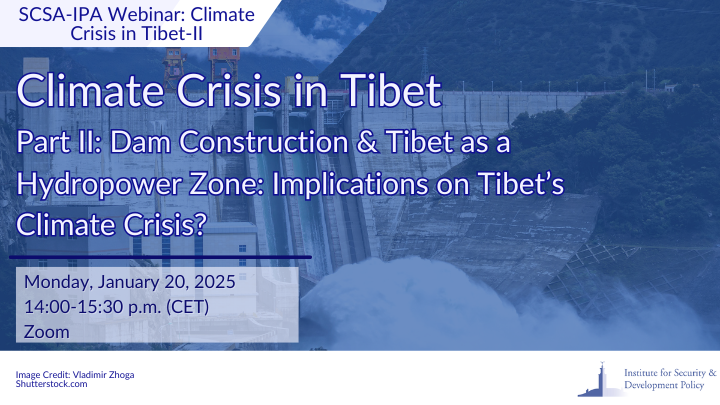Climate Crisis in Tibet – Part II: Dam Construction & Tibet as a Hydropower Zone: Implications on Tibet’s Climate Crisis?

Did you miss this webinar? The full recording is available on ISDP’s YouTube channel.
In recent years, China’s territorial aggression in the Himalayas, including in the Tibetan Plateau, has been growing. China’s strategy has focused mainly on using the continental version of the well-known “salami tactics” on neighbors like India and Bhutan. Notably, Tibet is a major source of insecurity for the Chinese ruling regime, namely the Communist Party of China (CPC). In Tibet, apart from the build-up of the people’s Liberation Army (PLA) and its activities to pursue Tibetan repression in the restive provinces, the CPC’s stress is also on accelerating infrastructure development, from building mega-dams to mining activities.
In this context, China has been constructing dams on rivers originating in Tibet such as the Yarlung Tsangpo (called the Brahmaputra River in India) for hydroelectricity generation and irrigation purposes. As per reports, China has built thousands of dams (more than 87,000) over the years. Moreover, China’s Ministry of Water Resources has accelerated the construction of reservoirs, dikes, and detention basins, with the capacity of the country’s reservoirs being increased by 163 billion cubic meters.
Naturally, as a number of rivers originate in Tibet and as most are often trans-boundary rivers (Brahmaputra; Mekong; and Salween, the second-longest river in Southeast Asia after the Mekong where thus far no dams, have been completed] to name a few), the environmental impact will be borne heavily by Tibet and the lower riparian countries like India, Bangladesh, Laos, Myanmar, and Vietnam. One of the CPC’s strategies to control access to water for China “hydro-hegemony” purposes.
The repercussions are already beginning to show: In Southeast Asia, farmers and fishers across the Mekong River region experienced debilitating droughts in 2020 itself. Research has shown that this was directly due to Chinese engineers actively working to limit the river’s flow. Notably, China’s over-damming of Tibetan rivers has been pursued under a faulty assumption of the seismic potential on the Tibetan Plateau. Increased seismic activity could impact the structural integrity of the dams, further threatening the geological equilibrium and potentially causing damage to cultural heritage sites built along the rivers.
Be it the planned construction of the Kamtok (Gangtuo) dam in the sacred Tibetan mountains – one of the many dams proposed along the upper reaches of the Drichu (Yangtze) river – or reports about a new dam on the Mabja Zangbo River (which flows into Nepal’s Ghaghara or Karnali before joining the Ganges in India) in Tibet’s Burang county, bordering Nepal and India, the Chinese strategy to control Tibetan resources and divert waters for its own insatiable energy and other requirements will wreak havoc on the whole Himalayan region, and beyond.
Although international forums and research organizations such as the United Nations Framework Convention on Climate Change (UNFCCC), the Intergovernmental Panel on Climate Change (IPCC), and the Nepal-based International Centre for Integrated Mountain Development (ICIMOD have already highlighted the impact of unfettered and large-scale hydropower development on ecological concerns, precious little has been achieved. Given the urgency of global warming and the melting of the Third Pole in particular, such hydropower investments need to be examined.
This webinar, second in a series on the Climate Crisis in Tibet, looks to address the following questions with a range of experts:
• What are China’s key hydropower projects? How many of these are mega dams? Which rivers originating from the Tibetan Plateau will be impacted?
• What is the projected and actual scope and ambit of these initiatives? More importantly, what are the ecological effects on wildlife and on biodiversity?
• Are other countries in South and Southeast Asia partnering with China? Which countries are involved? And, why are they involved?
• To what extent has China already weaponized water as a critical resource? What can be done to control this weaponization?
• What are the regional and global implications of both China’s damming and its developing Tibet as a hydropower zone?
• How can awareness about the projects and their impact be increased among the international community? What must the world take note of?
• How can the international forums, including UN-led multilateral forums like the UNFCCC, contribute to stemming over-damming of trans-boundary rivers?
Speakers:
 Dr. Antonina Łuszczykiewicz-Mendis, a former Fulbright senior scholar at Indiana University-Bloomington in the United States, served as the founding director of the Taiwan Lab Research Center at the Jagiellonian University in Krakow until February 2023. She is an assistant professor at the Jagiellonian University and a research fellow of the Central European Institute of Asian Studies in Bratislava. Antonina is the author of over 150 books and book chapters, journal articles, and conference papers on China-India-US relations, Poland-Taiwan relations, and Cold War history. She was educated and gained her research experience at the Jagiellonian University in Krakow, Xi’an Jiaotong University in China, and the University of Cambridge.
Dr. Antonina Łuszczykiewicz-Mendis, a former Fulbright senior scholar at Indiana University-Bloomington in the United States, served as the founding director of the Taiwan Lab Research Center at the Jagiellonian University in Krakow until February 2023. She is an assistant professor at the Jagiellonian University and a research fellow of the Central European Institute of Asian Studies in Bratislava. Antonina is the author of over 150 books and book chapters, journal articles, and conference papers on China-India-US relations, Poland-Taiwan relations, and Cold War history. She was educated and gained her research experience at the Jagiellonian University in Krakow, Xi’an Jiaotong University in China, and the University of Cambridge.
 Mr. John Jones is Head of Campaigns, Policy and Research at Free Tibet and Tibet Watch, where he has worked for nine years. Working with a dedicated Tibetan field team, he has conducted and overseen research on a range of topics. These include Tibet’s environment, the ecological and social effects of mega development projects on Tibet and environmental protests by Tibetan communities against mining and hydropower dams. He has a background in conflict and development studies and human rights.
Mr. John Jones is Head of Campaigns, Policy and Research at Free Tibet and Tibet Watch, where he has worked for nine years. Working with a dedicated Tibetan field team, he has conducted and overseen research on a range of topics. These include Tibet’s environment, the ecological and social effects of mega development projects on Tibet and environmental protests by Tibetan communities against mining and hydropower dams. He has a background in conflict and development studies and human rights.
 Dr. Medha Bisht is an Associate Professor in the Department of International Relations and works at the intersection of water governance and diplomacy at international, transboundary, and local scales. She also looks at transnational networks in International Relations (with a special focus on the water, climate, and energy sectors). She has undertaken consultancies with UNIFEM, ICIMOD, UNDP, IUCN, OXFAM, DFID/Asia Foundation, University of Arizona on issues related to women and governance, water diplomacy and energy cooperation. Dr Bisht also regularly delivers lectures at the Sushma Swaraj Foreign Service Institute, Ministry of External Affairs on transboundary water issues and has participated in Track 2 and 1.5 dialogues on climate change. She is a member of regional and international working groups on transboundary rivers and climate change at ICIMOD and has led and co-led international projects on water governance and diplomacy with Dhaka University, IUCN, Uppsala University, Sweden, WWF (P), Lahore, IHE, Delft, Netherlands.
Dr. Medha Bisht is an Associate Professor in the Department of International Relations and works at the intersection of water governance and diplomacy at international, transboundary, and local scales. She also looks at transnational networks in International Relations (with a special focus on the water, climate, and energy sectors). She has undertaken consultancies with UNIFEM, ICIMOD, UNDP, IUCN, OXFAM, DFID/Asia Foundation, University of Arizona on issues related to women and governance, water diplomacy and energy cooperation. Dr Bisht also regularly delivers lectures at the Sushma Swaraj Foreign Service Institute, Ministry of External Affairs on transboundary water issues and has participated in Track 2 and 1.5 dialogues on climate change. She is a member of regional and international working groups on transboundary rivers and climate change at ICIMOD and has led and co-led international projects on water governance and diplomacy with Dhaka University, IUCN, Uppsala University, Sweden, WWF (P), Lahore, IHE, Delft, Netherlands.
 Ms. Dechen Palmo is an environmental researcher at the Tibet Policy Institute, specializes in Tibet’s transboundary rivers, with a focus on the Mekong and Brahmaputra. Her research delves into the damming crisis, examining China’s strategic interests in these vital water systems. By assessing the environmental and geopolitical ramifications of hydropower projects, Dechen sheds light on their impacts on regional ecosystems and international relations, advocating for sustainable policies to manage transboundary water resources effectively.
Ms. Dechen Palmo is an environmental researcher at the Tibet Policy Institute, specializes in Tibet’s transboundary rivers, with a focus on the Mekong and Brahmaputra. Her research delves into the damming crisis, examining China’s strategic interests in these vital water systems. By assessing the environmental and geopolitical ramifications of hydropower projects, Dechen sheds light on their impacts on regional ecosystems and international relations, advocating for sustainable policies to manage transboundary water resources effectively.
 Dr. Anna Hayes is a senior lecturer in International Relations in the College of Arts, Society and Education at James Cook University, Cairns. She is also an Honorary Research Fellow at the East Asia Security Centre. Anna specialises in non-traditional threats to security, with a particular focus on China. She has presented numerous papers in Beijing, on topics ranging from the situation in Xinjiang, how the BRI has been viewed outside of China, as well as the Quad and the Indo-Pacific from the Australian perspective. Anna has published numerous articles, book chapters and edited books on these topics.
Dr. Anna Hayes is a senior lecturer in International Relations in the College of Arts, Society and Education at James Cook University, Cairns. She is also an Honorary Research Fellow at the East Asia Security Centre. Anna specialises in non-traditional threats to security, with a particular focus on China. She has presented numerous papers in Beijing, on topics ranging from the situation in Xinjiang, how the BRI has been viewed outside of China, as well as the Quad and the Indo-Pacific from the Australian perspective. Anna has published numerous articles, book chapters and edited books on these topics.
Moderator:
 Dr. Jagannath Panda is the Head of the Stockholm Center for South Asian and Indo-Pacific Affairs (SCSA-IPA) at the Institute for Security and Development Policy (ISDP), Sweden. Dr. Panda is also a Professor at the Department of Regional and Global Studies at the University of Warsaw; and a Senior Fellow at The Hague Center for Strategic Studies in the Netherlands. As a senior expert on China, East Asia, and Indo-Pacific affairs, Prof. Panda has testified to the US-China Economic and Security Review Commission at the US Congress on ‘China and South Asia’. He is the Series Editor for Routledge Studies on Think Asia.
Dr. Jagannath Panda is the Head of the Stockholm Center for South Asian and Indo-Pacific Affairs (SCSA-IPA) at the Institute for Security and Development Policy (ISDP), Sweden. Dr. Panda is also a Professor at the Department of Regional and Global Studies at the University of Warsaw; and a Senior Fellow at The Hague Center for Strategic Studies in the Netherlands. As a senior expert on China, East Asia, and Indo-Pacific affairs, Prof. Panda has testified to the US-China Economic and Security Review Commission at the US Congress on ‘China and South Asia’. He is the Series Editor for Routledge Studies on Think Asia.